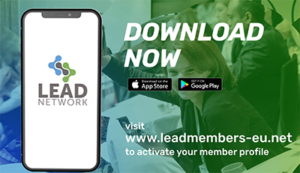On 7th December, around 30 women from the CPG & Retail industry in the UK gathered at the Nabarro LLP offices in London for the last LEAD UK Chapter Event of the year.
Sharon Jeske, Executive Director of LEAD presented highlights from a successful year for the LEAD Network, highlighting the 60+ volunteers who give of their precious time to take LEAD from the grass roots organization that it started out as, to the organization it is becoming today. She also spoke about LEAD’s successful conference that took place in Dusseldorf in October and is experiencing around a 30% increase in delegates every year, and looked forward to the November 2017 event being hosted by Ahold Delhaize in Amsterdam which will be held under the theme of ‘transformation’. Sharon closed by inviting those in the room to become their company’s champion of the LEAD mission and to volunteer to sit alongside Sue on the LEAD UK Chapter committee.
Sue Knowles introduced the special event speaker Alaba Okuyiga, from ENEI (Employers Network for Equality and Inclusion) who was invited to speak after a previous meeting where those present expressed an interest in the topic of unconscious bias.
Unconscious biases are our unintentional people preferences, formed by our culture and experiences, including exposure to the media. They are the result of our limited cognitive capacity, whereby we implicitly and automatically both group and categorise people to avoid having to conduct completely new assessments for every person.
Within a company context, unconscious bias can become a risk to the business as leaders may tend to surround themselves with individuals with whom they have an affinity and who are similar, but who do not challenge them. Similarly, if these key individuals are the focus of the company’s investment and become overworked, then a company could find itself in a position of having lost all of its developed talent at the same time.
Common instances where unconscious bias occurs are in the review of CVs where recruiters tend to develops shortcuts (eg. based upon nationality, address, further study institution) or in the form of ‘gender benevolence’, which usually stems from an attempt to be supportive but where a decision is made for an individual that relates to their career, without consulting them. Mechanics that a company can consider when to minimise the effect of unconscious bias are:
- Performing pay and progression analysis (and letting staff know the outcome)
- Carrying out assessments of the company culture
- Develop working practices that reduce or aspire to eliminate stigma
- Building a strong pipeline
- Addressing promotion and pay gaps
- Providing mentoring opportunities (particularly effective when across sectors to give a
- different perspective)
- Building inclusive cultures across all aspects of diversity
Alaba Okuyiga also provided some practical tips as follows:
| Tip | Example |
| Review paperwork and processes | Remove names from CVs / fair and objective scoring system, note patterns in performance data |
| Watch for triggers | Don’t interview on a Friday afternoon |
| Extend your networks | Sponsor someone who is not like you |
| Avoid reinforcing biases | Avoid and challenge the ‘banter’, change your newspaper |
| Use exemplars and role models | Actively remember leaders from our groups and their positive contribution |
While unconscious bias cannot be trained out of people, tests can alert you to your biases that will develop your awareness of your tendencies. Leaders in today’s world should never stop challenging their perceptions and being open to challenges from those around them, as often shaking up staid business processes can lead to business excellence.
Following Alaba’s presentation, Janet Lung Standing, LEAD member for several years now, spoke of her personal story which had resonated with many in LEAD’s October newsletter. Inspired by a speaker at the 2015 LEAD Annual Event, she left her global job with one of the world’s biggest to spend more time with her family and causes that she cares strongly about. Despite some fears about venturing into the unknown, she benefited from the support and encouragement of other LEAD members on her journey. One year on, she is still proud of her decision and celebrating her achievements along the way.
Sue Knowles wrapped up the evening with an overview on plans for the LEAD UK Chapter for 2017, and asked for some feedback from those present on the format of the meetings, location and proposed dates. It was agreed that the timing (end of the afternoon into the early evening) was most suitable, and that at least one meeting a year should be held in London and in Birmingham.
The event concluded with a networking drinks reception, and LEAD would like to extend a huge thank you to Nabarro LLP for hosting the event in central London, and to Sue Knowles and Krystal Cheetham of CostCo UK for organising the meeting.



